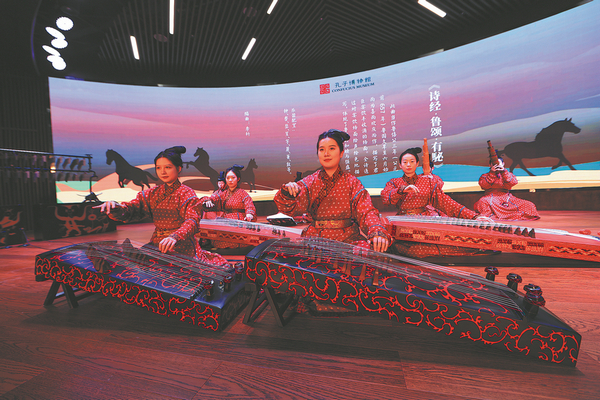

Forum emphasizes vital contributions that harmony in diversity can bring to today's troubled world, Yang Feiyue and Zhao Ruixue report in Qufu, Shandong.
The Nishan Mountains, about 30 kilometers southeast of Qufu in Shandong province, might not stand out for their landscape or their size, covering an area of just seven square kilometers and rising to a height of only about 340 meters. But the fact that they were the birthplace of the great philosopher and educator Confucius 2,500 years ago has turned the area into an attraction for visitors from far and wide.
The latest proof comes in the form of the Ninth Nishan Forum on World Civilizations, which was first staged in 2010, and is widely expected to play an important role in promoting exchange and learning among different civilizations, advancing the construction of a harmonious world, and building a community with a shared future for mankind.
"The Nishan Forum on World Civilizations is a wonderful initiative. Really it's a gift for the whole world, because it brings together people from all over to learn about Confucius and other traditions and sages of the past — learning that can help us live harmoniously in the world today," Jeffrey D.Sachs, president of the United Nations Sustainable Development Solutions Network, said at the forum.
Sachs believes that forging a better understanding of the world and the creation of workable common values will be a long and rocky road.
"It will have to come through collective interaction over many years of discussion, debate, encounters and the realization of our commonality as humans, and our common interests on the planet," he says.
He considers the forum an opportunity for participants to engage in civilizational dialogue, learn from each other, respect each other's cultures and traditions, and find shared values for the 21st century.
This year's forum is devoted to the Global Civilization Initiative proposed by President Xi Jinping in March, which seeks to foster coexistence and prosperity through exchange and learning, says Shandong provincial Party secretary Lin Wu.
Lin believes that modern Chinese civilization is both deeply connected to and inseparable from traditional culture, and says that the province is willing to work with people from all over the world to create a modern civilization of cultural prosperity, common prosperity, environmental friendliness, openness and inclusiveness, and to contribute more to the creation of a community with a shared future for mankind.
This year's event brought together politicians, representatives of international organizations, diplomats, experts and scholars.
Their discussions ranged from academia to international politics, culture and traditional Chinese medicine, but all focused on the urgent need to devise a set of shared global values vital to addressing multifaceted global challenges.
"Currently, the world is undergoing changes and a rapid evolution unprecedented in the past century," Wang Xuedian, executive dean of the Advanced Institute of Confucian Studies at Shandong University, told the forum.
"Competition between great powers is intensifying, geopolitical conflicts are increasing, anti-globalization sentiment is on the rise, unilateralism and protectionism are clearly on the upswing, global issues are worsening, and the world is entering a new period of turbulence and transformation. Humanity is facing a time of constant challenge and growing risk," he said.
Wang attributes this predicament to the inability of different cultures to reach mutual understanding, respect and trust.
"Diverse geographical environments and living conditions have shaped modes of production, ways of life, organizational structures, thinking habits, and value systems around the world. This has led to cultural diversity," Wang says, adding that recognizing and preserving the diversity of human culture is essential to achieving inclusiveness, coexistence, and mutual learning.
"Only by doing so can we truly eliminate the root causes of international conflicts, and embark on a path of win-win cooperation," he says.
In the past, Chinese dynasties believed that there were no absolute divisions between Han Chinese and other ethnic groups in terms of blood or racial ties, and that the only difference was in values and culture, Wang says.
Therefore, the principle of harmony in diversity was often used as the guiding principle in heterogeneous, multicultural civilizations, he explains.
"In other words, Chinese civilization has historically been held together by soft power, cultural charm, or its level of civilization. The more inclusive it was, the more recognition it got, and the more it continued to thrive," Wang says.
"Deep cultural identity and a profound historical consciousness endow Chinese civilization with a strength for self-development, and ability to respond to challenges, and create new prospects, enabling it to endure countless difficulties and constantly rejuvenate," he adds.